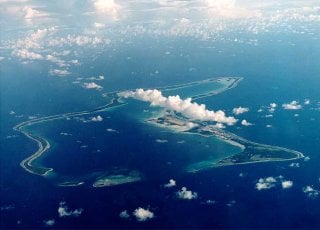Diego Garcia Is America’s Next Overseas Challenge
Allowing a sovereignty dispute to fester will create a natural opening for Beijing to claim that the United States and the UK are acting inconsistently with universal norms favoring decolonization and self-determination and, perhaps, insinuate themselves economically or politically into Mauritius.
-
The ninety-nine-year lease needs to be enshrined in a legally binding agreement so that it has the greatest potential of lasting for ninety-nine years and weathering the political ups and downs in a bilateral relation or petulant leadership (such as the United States has recently experienced in its basing relations in the Philippines).
-
The United States would provide a security guarantee to Mauritius similar to that which it has provided to other countries in mutual defense agreements. That relationship would also be implemented in related joint defense planning arrangements which may also include the Indian Armed Forces.
-
The operating rights of the United States at the base must replicate those which currently exist i.e., that the United States is able to use the base for its “national” operations as well as those which may be authorized as a Chapter VII enforcement action under the UN Charter. Further, the right of the United States to make the decision to allow allied and friendly forces to make port visits and logistics stops (including granting landing rights) at DGAR must be preserved. All of those decisions to permit sea and air access will be notified to Mauritius.
-
U.S. (or UK) occupancy must be premised on security and economic ties and Mauritius and the US must view one another as security partners. For that reason, the US should find ways to use the basing agreement as a mechanism to assure Mauritius a level of industrial participation in the continued operation of the base. Consideration might even be made to the U.S. establishing a ship repair facility in Diego Garcia which could be a basis for high-wage employment of Mauritian employees. This would be in addition to allocating a larger portion of the normal contractor support functions to Mauritian contractors.
-
The Mauritian government would acknowledge the right of U.S. forces to allow ships and aircraft that are nuclear weapons capable to make visits to DGAR consistent with the ANWFZ Treaty. Conversely, the United States would agree to take no action that would put Mauritius’ treaty obligations at risk.
-
Mauritius would give legally binding guarantees that it will not offer a base or access rights to other countries within the Chagos Archipelago or within a specified radius of DGAR. Similarly, Mauritius would agree to not resettle any former Chagos residents anywhere within one hundred miles of the base and work with the United States to establish—and allow the United States to enforce—a maritime security or air defense interception zone around DGAR to protect against the incursion of hostile foreign aircraft or vessels.
-
Mauritius would acknowledge that U.S. law and policy would apply to the administration of the base on DGAR especially as regards to labor and environmental laws. If left unstated, then this could become a major friction point in the future.
Timing
Bashfield, who is from the Lowy Institute in Sydney, Australia, writes that the issues involving DGAR are much bigger than ANWFZ and that the “real game” is for the United States, UK, India, Mauritius and other players to “uphold the order in the Indian Ocean.” Consequently, resolving each and every sovereignty or nuclear weapons issue should be secondary to the overall question of retaining an allied base on the Chagos as a counterbalance to Russia and China. After all, DGAR is an irreplaceable piece of real estate because of its roughly equidistant location and because of the operational freedoms which the United States currently enjoys. That sort of operational freedom is unique and almost as precious as the island real estate. But those freedoms are neither guaranteed or totally within Washington’s control unless it secures them.
Considering China’s aggressive “String of Pearls” activities in South Asia, West Africa and among Pacific Island nations to gain political and economic leverage, it seems clear that maintaining a dominant U.S. economic and political position in the Central Indian Ocean is a wise policy move for Washington. Allowing the sovereignty dispute to fester creates a natural opening for Beijing to claim that the United States and the UK are acting inconsistently with universal norms favoring decolonization and self-determination and, perhaps, insinuate themselves economically or politically into Mauritius. At a minimum, the festering dispute could adversely affect any later base negotiations and could turn public opinion in Mauritius against a future U.S. base at DGAR. Given these risks, and the expired UNGA deadlines for the UK to relinquish administrative control, Washington would do well to elevate the importance of this issue in its policy planning and to work with the UK to chart a path to take advantage of Mauritius’ goodwill gesture.
The views expressed here represent those of the author. They do not represent the opinions of CNA or any of its sponsors.
Mark E. Rosen is the SVP and General Counsel at CNA. A retired Navy Captain (JAGC) who served nearly nine years in the Pentagon as a military planner and international affairs advisor, Mr. Rosen’s particular expertise is in the maritime field including maritime disputes, piracy, maritime security and maritime arms control. Mr. Rosen holds an appointment at GW School of Law. The views expressed in this article are those of the author alone and do not necessarily represent the views of CNA or any of its sponsors.

